Dr. Ferdinand Stanislaus Pawlikowski

Personalia
Born:
Died:
Profession:
Persecution:
Imprisonment 13.03.1938 - 14.03.1938
Memberships
Curriculum Vitae
Ferdinand Stanislaus Pawlikowski initially completed a textile trade apprenticeship after elementary school, but later completed his A-levels while working as an educator for Count Pierro Consolati. He is briefly a member of the Redemptorists in Katzelsdorf near Wiener Neustadt. He then attended courses at the Trent seminary as an external student. After completing his theological studies, he was ordained a priest in Trento in 1903 and incardinated into the Archdiocese of Salzburg. He interrupted his chaplaincy in Bischofshafen and Wals in 1905 to continue his studies in Rome, where he was awarded a doctorate in theology in 1907. From 1908, he worked in the military chaplaincy at the field superiorate in Innsbruck. After a year as field curate in Bolzano, he was transferred to the field vicariate in Vienna, where he was in charge of the register. During the First World War, he supported the Apostolic Field Vicar Bishop Emmerich Bjelik (1860-1927) as Field Consistorial Secretary on his inspection tours.
After the war, he first had to deal with the dissolution of the field vicariate and then joined the military chaplaincy of the Austrian Armed Forces, where he was particularly involved in its development. Appointed army provost in 1920, he served as military vicar from 1924 to 1938. The Marian Soldiers' Congregation, which he founded in 1926, was transferred to the Catholic German Soldiers' Association in 1928.
On 16 January 1928, Ferdinand Stanislaus Pawlikowski was awarded honorary membership of the student fraternity Traungau, then that of the student fraternity Carolina and the student fraternity Glückauf Leoben. The student fraternity Babenberg Graz appointed him High Patron in 1930.
In 1927, he was appointed Titular Bishop of Dadima and Auxiliary Bishop in Seckau to support Prince-Bishop Leopold Schuster (1842-1927) and was consecrated Bishop on 27 March by the Archbishop of Vienna Friedrich Cardinal Piffl (1864-1932). Pius XI (1922-1939) appoints Ferdinand Stanislaus Pawlikowski as his successor in Graz/Seckau on April 26, 1927 after the death of the prince-bishop. Shortly afterwards, he received honorary membership of the student fraternity Winfridia.
On 12 March 1938 at 7.00 a.m., SA men forced their way into the Bishop's Palace and Bishop Ferdinand Stanislaus Pawlikowski was insulted for several hours. His house was searched extensively in a rough and ruthless manner and important documents were taken away. He is initially placed under house arrest by the SA until the evening. On March 13, 1938, three detectives appeared again at 11.30 a.m. and initially placed him under house arrest. After lunch he was arrested, taken to Graz police prison and placed in a solitary cell. Here he is treated like any other prisoner, no consideration is given to his office and the respect due to him, on the contrary, the SS take particular pleasure in it. He was released the next day at around 1 p.m. following the intervention of the Holy See, but with a warning from the chief of police never to interfere in politics again. The reason given for the arrest was: "protection from the mob".
In his complaint to Seyß-Inquart, Ferdinand Stanislaus Pawlikowski invokes, among other things, his capacity as "officer of the special services of the military chaplaincy", which he asked to perform as military vicar, holding the rank of major general. Efforts to discuss the matter with the newly appointed Gauleiter Dr. Sigfried Uiberreither in order to reach a modus vivendi were unsuccessful.
For the next two years, the bishop was monitored at every turn despite being promised freedom of movement: speeches and sermons were recorded, visitors were carefully noted, and he was accompanied on his visits by a party member. However, he cannot be personally reproached. On the other hand, those in power were all the more ruthless in their actions against the priests. The National Socialists also managed to have him stripped of his honorary citizenship of Graz.
In addition to Petrus Legge (1932-1951), Bishop of Meissen and imprisoned from 1935-1937, Ferdinand Stanislaus Pawlikowski was the only bishop in Austria to be imprisoned by the Nazi rulers.
Places
Place of activity:
Citations
Krause, Peter/Reinelt, Herbert/Schmitt, Helmut (2020): Farbe tragen, Farbe bekennen. Katholische Korporierte in Widerstand und Verfolgung. Teil 2. Kuhl, Manfred (ÖVfStG, Wien) S. 246 - 248.
Archiv Ritterorden vom heiligen Grab zu Jerusalem (OESSH)
